
SEO, as any area of our life, is swarming with myths and misconceptions. They are usually born out of ignorance, fear, and hunt for quick results. It is like a variety of diet advice — "cut entirely on the food, just eat one weird vegetable three times a day". Yes, you might lose weight. But will it last? Will you be happy in the process? You tell me.
Same here. People are prone to choose quicker methods. Well, life is too short. Who needs all those long-term results. But we surely need an efficient outcome. Plus, the damage after a quick SEO campaign based on the general misconceptions will take way more time to recover from than applying a well-thought SEO procedure.
However, while people continue to go for quick results and no research, these myths will never cease to exist. What you need is to recognize them as such and treat any information with caution. Knowledge is power. Thorough knowledge is indestructible!
I made a compilation of the most popular myths (that made up a nice number of 13) and tried to debunk them once and forever (or at least for some time). Let's see whether we are on the same side, and if not, let's check whether I can change your mind.
RankBrain, semantic search, AMP, and mobile-first are among the top buzz words of the past twelve months. Penguin and Panda have become smarter and are now part of the core algorithm.
So, to help you catch the wind and brush up your SEO skills, I've prepared a list of recommendations SEOs should focus on right now.
The Myth
They promised to get you to the top of the SERPs for 50$ per month but it never happened. Thus, everything which is called SEO is a big fat lie, and everyone who offers SEO services is a scoundrel.
The Busting
You know how one person does not characterize the whole nation? Likewise, one fraudulent business does not characterize the whole area of activities. It is tempting to go for big promises and low prices, but you have to know that everything has its true value (and its price range!)
When someone promises that you will speak a foreign language from a zero level in a month, you clearly understand that it is not possible and you won't go for it (unless you are a genius). Same here. SEO takes time to show results, it is an ongoing process that requires time, lots of effort, or some help of a specialist.
So if you tried SEO for a few weeks and didn't see instant results, or if you used the services of scam businesses that claimed they knew the algorithm their buddy Google uses, then you basically have no right to say that SEO is a fraud. It is just not SEO, as simple as that.
How to deal with it
At this point please accept that SEO is not a scam, instead it helps you to rank higher in a natural way providing you create great engaging content, build quality links, format your pages, etc. For example, if you have noticed, the company I have a job at devoted its activities to making SEO software. It would be a shame if our restless efforts to help people to optimize their websites would be proclaimed a fraud. We have described a workflow for our software to create a winning SEO campaign. Give it a try, and then we can talk.

2. SEO is all shenanigans.
The Myth
You Google something, click the result, and all you get is the text stuffed with keywords, duplicate content, and suspicious links that redirect you to weird places. If that is all that SEO achieved, then you won't get mixed up with it.
The Busting
It is funny how people react when I say that I work in SEO. I immediately see a glint of recognition in their eyes: "Ahh, putting keywords everywhere!" Apparently, that is what the whole SEO community does according to the outside world. It is amazing how this keyword density stigma is rooted in people's minds. True that in the past it really worked. But since then the search engines' algorithms have gone way beyond this simple technique.
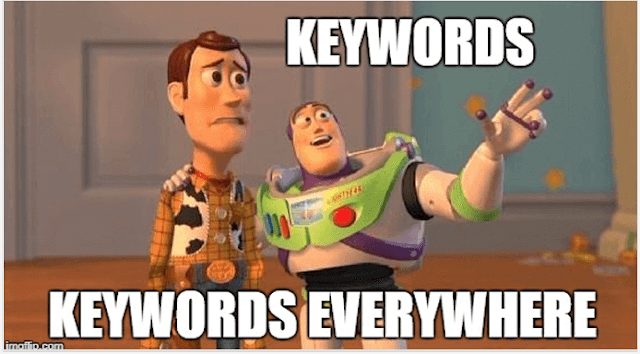
What I'm getting at is that each technique that you overdo turns into manipulative black-hat SEO:
The Force The Dark Side
Black-hat SEO may give really quick and seemingly good results, but Google will certainly penalize for the things it frowns upon or frankly despises. Here is the illustration of what you get depending on which strategy you have chosen (in time and effort relation):
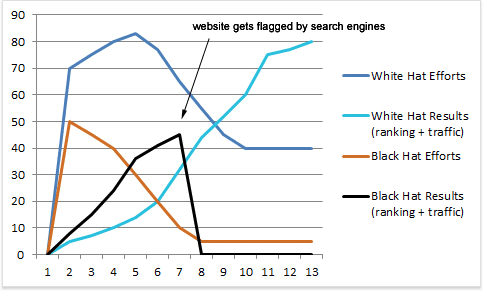
How to deal with it
If you want to optimize your website but fear being penalized, try to understand what your techniques do. If they add value and do not manipulate, then you are on the force side, even if your techniques may be thought to be bad for SEO. A white-hat strategy may take some time to show results, but when it does, the results will be sustainable. There is a good metaphor for that. Playing honest is like planting seeds and doing everything to grow the fruits. Manipulating is just selling seeds. The following list is what SEO really does. It surely doesn't look like shenanigans. It looks like what you need to do to cater to your website from different angles and reap benefits:
The Myth
Whatever you do with your website, Google applies new algos that undo all your efforts in a heartbeat. One day you enjoy high rankings, and another day your rankings are under the nine circles of Hell. Google certainly wages a war against everything SEO-based you try to apply.

The Busting
It is true that sometimes it feels like Google does everything to deprive SEO of any sense. Of course, it isn't like that. Google just minds its own business, which is making users happy. Thus, what it obviously hates is the manipulative SEO that uses every opportunity to increase rankings artificially. Otherwise, Google surely encourages SEO:
How to deal with it
First thing. Once and for all we have to put a steel separator between hard-working SEO and manipulative SEO.
Second thing. If we knew exactly how search engine algos work, all the intentions of better user experience would be gravely compromised due to elaborate loads of black-hat SEO.
Third thing. For every poison there is an antidote. If your rankings drop due to a new thingy from Google, eventually you will surely figure out what happened and How to deal with it You know, panic makes everything look bigger than it is. In reality, if you are a white-hat SEO player, it usually requires just a bit of tweaking to get back on track.
4. One-time SEO effort is enough.
The Myth
You did an SEO campaign once, and it either gave no results (and you are not interested in making more effort, as it obviously seems useless), or it gave good results (and you are not interested in going further, as you are satisfied with the current situation). Whatever the outcome, you are sure that it lasts. A small spoiler: Oopsie!
The Busting
In case you haven't managed to see quick results of your SEO campaign, remember what we have discussed above: SEO takes time to kick in. For the time being it is what you have to deal with.
As for one-time successful SEO campaigns… You know, everything tends towards chaos. And chaos arranges into order only at the scale of the Universe. In other words, without continuous improvement and maintenance everything falls into degradation. So if you set your website adrift, here is what you will face:
How to deal with it
Use Google Analytics to check the engagement factors (like bounce rate, CTR, session duration, new visitors, number of visited pages, etc.) If these metrics' value is lower than average, it means that users are not quite happy with your website or they cannot even find it.
A good idea is to monitor your rankings regularly with SEO PowerSuite's Rank Tracker:
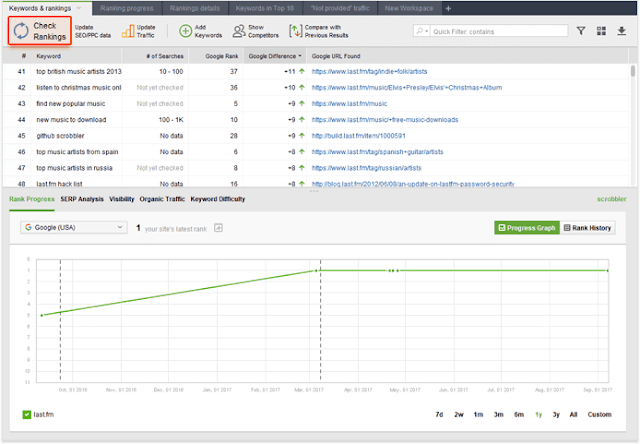
Plus, if you hope that Google will figure everything out for you and pick up the very pages you need people to see, you are really an optimist. You have to give search engines some technical clues to your website, where to go and what to see. For example, you can update your robot.txt file, save poor orphan pages from being alone and forgotten, and get rid of the duplicate ones. All these options are available in the SEO PowerSuite's WebSite Auditor.
5. Link building is dangerous.

The Myth
The Google guys use every opportunity, when asked publicly, to show they are not too thrilled about link building. For example, the world will never be the same after the words of Google's John Mueller that link building is something he'd "try to avoid."
This distaste for "unnatural" links starts right in the Webmaster quality guidelines:
"Any links intended to manipulate PageRank or a site's ranking in Google search results may be considered part of a link scheme and a violation of Google's Webmaster Guidelines."
Your link profile should grow naturally over time — only this approach may assure Google you are onto quality backlinks.
The Busting
As it often happens, many misinterpreted the statements from Google and started to think that link building per se is bad, and you will be penalized for it. It is far from the truth, as search engines heavily use link authority in their algorithms.
White-hat link building is a legit way to build up your website authority, it is a marketing practice successfully tested with time. What you should not do is build millions of useless links to rank higher overnight. If you act like that, you will certainly be penalized. We have covered this topic already — every effort that adds value to what you do is great; every action that is manipulative is a bit of a crime.
How to deal with it
The best case scenario: you aim for high quality links from trustworthy sources. However, quality is not something black or white, its definition varies depending on the sphere of application. There is a good technique that works almost for everything in this Universe to understand things better and evaluate them more comprehensively. All we need is to compare!
In this particular situation you can thoroughly examine link profiles of your best ranking competitors to get an idea of what kinds of links work in your field. You can do it in SEO PowerSuite's SEO SpyGlass:
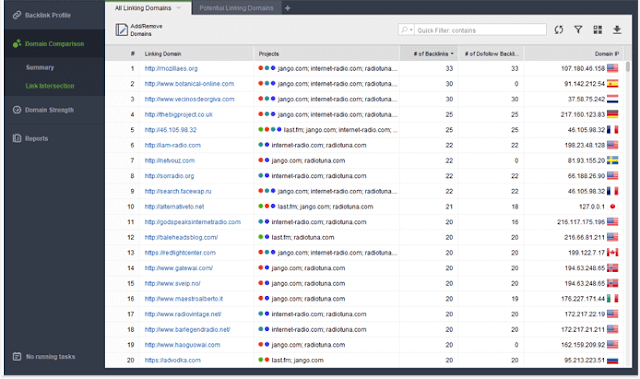
6. CTR is out of the game.
The Myth
According to Gary Illyes:
"CTR is too easily manipulated for it to be used for ranking purposes".
This is what we get from the Google team once asked upfront about CTR. In other situations they just avoid straightforward responses and drop hints. Thus, many SEOs have started to believe that SERP click-through rates are too noisy and easy to spam to be used as a ranking signal.
The Busting
I would never include this myth if it were not for its persistence. There is so much evidence against it that wherever you step, you hear: bust, bust, bust!
First of all, Google has a number of patents on using CTR for rankings, for example:
"The general assumption […] is that searching users are often the best judges of relevance, so that if they select a particular search result, it is likely to be relevant, or at least more relevant than the presented alternatives."
The same patents include methods to get rid of noise and spam that Google mentioned as the reason for not using CTR in the ranking algo.
However, patents are just theory. What do we see in reality? There was a curious experiment run by Rand Fishkin of Moz. One day he reached out to his Twitter audience and asked them to Google a particular thing, click on result No 1, and bounce back, then click on another result and stay there for some time. Have you guessed what happened next? That other search result became the first.
After some time this result came back to its rightful place. So, you see, CTR seems to influence rankings in real time. Temporary increase in clicks = temporary improvement in rankings.
Another set of experiments showed that the use of bots to manipulate search results just would not work. Google stores lots of info on each individual searcher. So a searcher with no history or an unnatural history would not pass for organic CTR.

How to deal with it
There are some ways to make your pages loveable by Google:
The Myth
After the release of Google's Hummingbird update in 2013, the universe of on-page SEO, mainly keywords research, was shattered. We were offered to believe that keywords were replaced for concepts, and there was no sense in keyword targeting anymore. According to Search Engine Land:
"Hummingbird is paying more attention to each word in a query, ensuring that the whole query — the whole sentence or conversation or meaning — is taken into account, rather than particular words."
Two more nails in the SEO coffin are Knowledge Graph and RankBrain, created to help Google understand queries like humans do. Now there is less focus on individual terms within a query but more on the nuances in its meaning.
The Busting
Actually, Google never openly stated that keywords were no longer important. As it usually happens after the major updates, SEOs themselves got a little panicky and made some extreme conclusions.
To be honest, the search engine algorithms get more and more sophisticated, but there is little magic there. Hummingbird and RankBrain did make a search process more about context and related concepts, which drastically changes the approach to keyword research. But it does not make it any less important!
In reality, Hummingbird affected keyword targeting in a positive way. You do not have to worry about keyword ratio anymore, what you need to do is understand searcher intent behind their queries. So keywords are important, as you will have to think for a reason beyond a particular keyword and create content to meet this need.
It is kind of impossible to find something not using keywords. Look, even authority platforms, like Twitter, YouTube, Instagram, Facebook, Pinterest, and others, rely on keyword targeting to meet their users' needs. According to Brian Dean, "Keywords are like a compass for your SEO campaigns; they tell you where to go and whether or not you're making progress."
How to deal with it
I know that you want to rank for those common keywords that are specific to your business niche/market place. But if you don't mind me saying — you don't. The competition is so tense that it is not worth your efforts — the traffic for these words will be small in comparison with the visits you can get from long-tail keywords. Long-tail keywords are more about users' intention, which is exactly what search algorithms are about right now.
With the algos getting more and more sophisticated, it is kind of difficult to do keyword research manually. A hand of help is SEO PowerSuite's Rank Tracker which has 20 keyword tools integrated right into it.
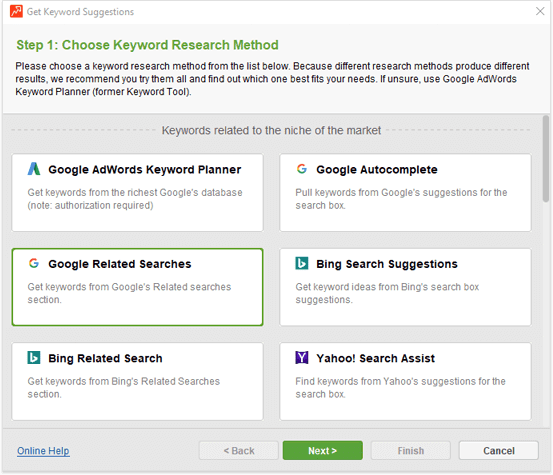
The Myth
Social signals are one of the most controversial factors in SEO. Back in 2010 Google's Matt Cutts published a video where he said that social signals were a ranking factor. In 2014 the same Matt Cutts clearly stated in his video that Google does not consider social signals a ranking factor.
The Busting
Do not allow yourself to be tricked. It is true that social signals are not used in ranking algorithms, but it does not mean that they cannot influence rankings. For example, social media pages are indexed, so they are able to appear in the SERPs.
The graph below from the study by Branded3 is particularly interesting: it shows the Google ranking for pages with over 1,000 tweets. As you can see, with 7,500+ tweets, a first page ranking is almost inevitable.

Booming social activity makes your content visible to the right group of users, which increases your engagement metrics. The more visits you get, the more sharing you receive that leads to more links to your content. It is a happy cycle.
How to deal with it
Providing you already have a social media account with a link to your website, there is no need for any specific optimization. A few tips, though:
Plus, we have the tool that will allow you to see where your website stands in terms of social media engagement:
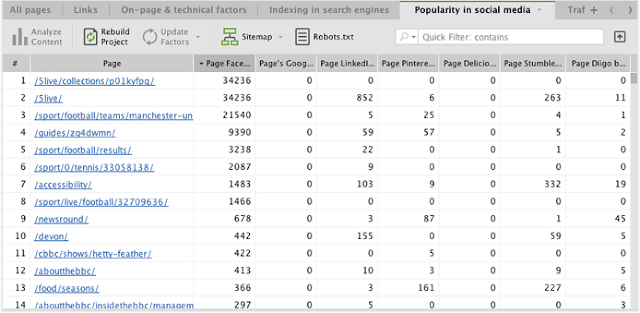
As your social media reach grows, you may want to use a social media monitoring platform (like Awario) to track mentions of your brand and respond to them in time.
9. Guest blogging is obsolete.
The Myth
In 2014 Matt Cutts said that "if you're using guest blogging as a way to get links … stop." This statement caused an uproar and immediate preaching against guest blogging.
The Busting
There is no technical difference between guest blogging content and any other type of content. If the content is crappy, then Google will penalize for it, guest or no guest. Just think, major news platforms use hundreds of contributions from freelancers and outside authors.
The frustration was so deep that on April 1, at least by means of a Fools' Day joke, Matt was "made" to indorse blogging (I thought initially that it was true, and I'm sorry to say so in the post):
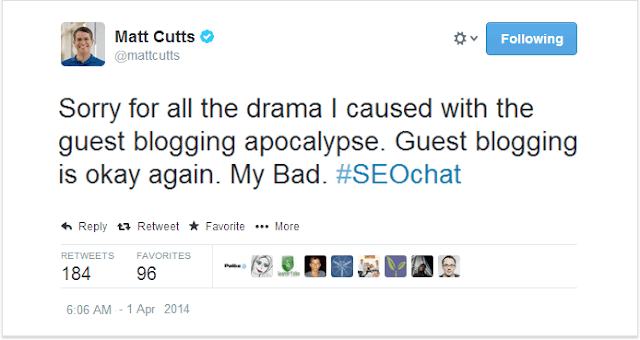
How to deal with it
As long as you follow the tips for guest blogging below, you should be safe:
If you are not quite sure where to start with guest blogging, we have just a tool that can help you to figure that out. You can find potential blogs where you can publish with the help of SEO PowerSuite's LinkAssistant. Just follow the lead:
1. Create a project for your site in LinkAssistant and hit Look for Prospects. Select a method you'd like to use and click Next.

At Step 2, enter your keywords. For keywords, use industry-related terms — both generic and long-tail — and even your competitors' brand names. If you feel you could use some keyword ideas from Google AdWords' Keyword Planner, click Get keyword suggestions.
2. Check the value of potential links. To see how reputable your prospects are, switch to the Prospect quality tab, select all records in your workspace, click Update, and select Authority:

Further on sort by Domain InLink Rank and examine the stats:

Once you have a list of websites, you can contact your potential partners for publishing opportunities.
10. High paid rankings = High organic rankings.
The Busting
Paid rankings and organic rankings function at different levels. Organic search results come from the index database, while sponsored links depend on your bid and investment. The conversion rate of traffic to PPC sponsored links is usually much higher comparing to organic traffic.
So paid ads can help to increase the conversion rate of organic results (it is possible to actively experiment with paid ads and apply the results to your natural search pages), but they have no relation to rankings.
How to deal with it
You totally can do without paid advertising. However, paid ads have a very good thing about them. Firstly, you can gain higher exposure for your brand. Secondly, due to the high conversion rate you can experiment and receive quick results that will allow you to change the strategy if needed.
You can target different kinds of keywords, and the CTR of paid ads will give you the insight to what keywords are the best on the global and local levels. So you will be able to measure the data efficiently and optimize your content for successful organic searches.
11. Keyword-optimized anchor text is bad for your SEO.
The Myth
After the first Penguin update in 2012 (that focused on spammy links, over-optimized anchor text, and link relevancy), most sites with optimized anchor text were penalized. As Penguin is no joke and is hard to recover from, it is better to stay away from keyword-optimized anchor text.

Google's guidelines confirm this line of thinking:
"Links with optimized anchor text in articles or press releases distributed on other sites are examples of unnatural links."
The Busting
Here we have to tell the difference between over-optimized anchor text and diverse anchor text. The first one is, obviously, a red light. But it does not mean you shouldn't optimize your anchor text for target keywords.
Microsite Masters did an interesting study on the basis of thousands of sites to see whether websites that had a ranking drop did any anchor over-optimizing. The results are quite amusing. The websites that got hit by Penguin had their target keyword for anchor text in over 65% of their backlinks, while sites that had keyword-optimized anchors for 50% of their links or less were "all but guaranteed" not to be affected by Penguin.
How to deal with it
Before Penguin it was possible to use keyword-rich anchor text for both internal and external links. Now it is punishable, so you have to change your approach. Diversify anchor text and make sure that it includes primary and secondary keywords, your brand, URL, and generic keywords.
All in all, you should focus on the three major types of natural anchor text:
To diversify your anchor text, you may have a look at your top competitors. SEO PowerSuite's SEO SpyGlass will help you out:
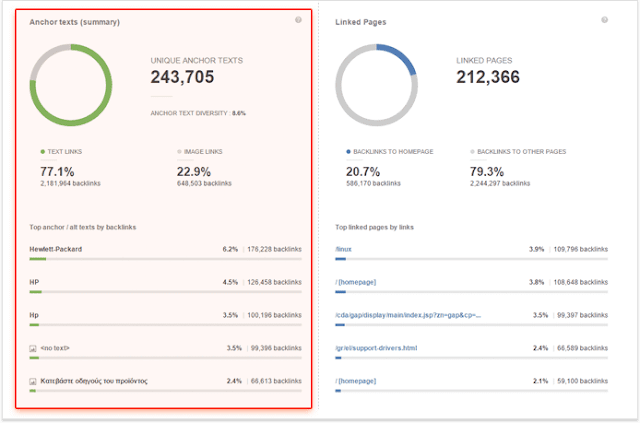
Do the same for your other competitors to find out the anchor trends that work in your niche, and build diverse anchor texts.

12. Separate pages for every keyword is a key to success.
The Myth
A page per keyword allows to create content specifically targeted for each keyword and maximize the ability to target this or that term or phrase.
The Busting
This strategy was perfectly workable in the past, but since then search engine mechanisms have drastically changed. Google's Hummingbird update considers such pages as low quality content due to its repetitive and spammy nature as well as its negative impact on usability.

Plus, your site architecture will become quite bulky and prevent search engines from distinguishing your unique value and delivering it to the SERPs.
The recent studies have shown that a single page can rank for a few (dozens and even hundreds!) of keywords, which means that it can show up in the same staggering quantity of SERPs.
How to deal with it
It is a good strategy to create one page that targets several keywords, which will maximize the usability of your website. However, do not cram the keywords randomly, so that they are just there. Optimize the page placing them where it makes sense.
A great way to create unique content is by focusing on searcher's intent. What I mean is that keywords may be different, but the intent beyond them can be the same (like "snowboard courses" and "snowboard school"), so one page of content may cover queries with different keywords.
As for keyword research, I have covered it in Myth 7. Check it out if needed!
The Myth
After yet another Google algorithm update, whatever SEO efforts you have applied, your gained rankings are just wasted.
You Google something, and o-la-la! Google gives you all the answers from its own database.
Aaaargh! What is it? Is SEO dead or something?
The Busting
Well, SEO is not dead. It is not even a zombie. It is just a shapeshifter. The only constant thing about it is change. An ever-evolving organism.
There are so many developments in the field — like mobile searches, semantic search, and so on — that Google Answers is the least to worry about.
I know that it is kind of frustrating not to have one reliable formula by following which you will definitely succeed. However, SEO is such a gigantic field of established and new practices that it is foolish to say that it is dead. Of course, if you cling to some outdated techniques that were effective before but now are punishable by the new Google algos, then you are more dead than SEO could be.
How to deal with it
Bust all the myths! Do not be stale! Get rid of the outdated tactics! Act smarter! May SEO be with you!

These are just the myths that amuse me most. But there are so many more of them out there. Each person who just once used a keyword in a title, meta description, or anchor text, claims to be an SEO specialist. However, as search engines try to please users and be more human-like, you have to stand in the shoes of an ordinary searcher to understand what everything should look like. And then listen to the real professionals from the SEO field to understand what to do to succeed in your aspirations.
Plus, as you have noticed, many myths are born out of false comprehension, fears, and gaps in knowledge. It happens not by fault of search engines' moves but in the SEO community itself.
Moreover, these new algorithms are not 100% perfect. To any top-notch update there will be a top-notch way to circumvent it. So we need to keep this balance and sift out bad or out-of-date practices and cheatings from approved techniques and our gut feeling.

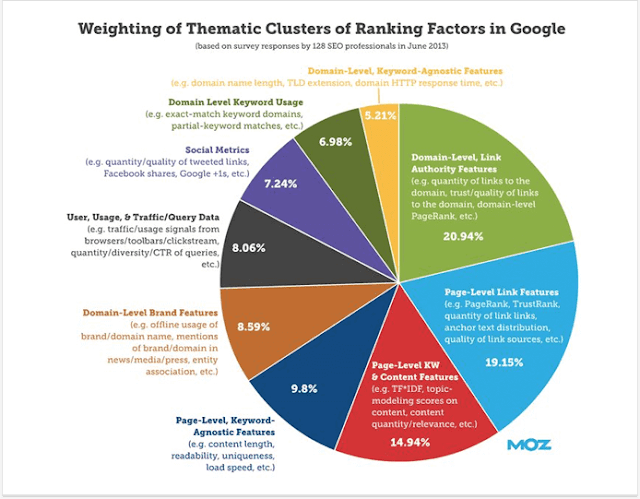


0 comments: